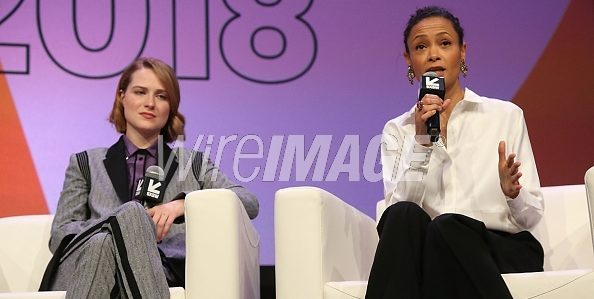Shawn’s SXSW Diary – Saturday: Odd Dissonances, Nice Surprises

Midwesterner, movie lover, cinnamon enthusiast.
My first day at the SXSW Conference and Festivals was also my first time in Austin. Taking the bus downtown, I quickly realized how much disdain SXSW causes for the locals. It’s not something I was unaware of, but taking the bus, I was able to more tangibly see how the festival affects residents — as something more than people annoyed that their favorite bar will be overcrowded for the week, but an event that throws a wrench in people’s daily logistics. And I’m sure the perception of many festival goers can be unfavorable — as cultural leeches borrowing other people’s town.
It was a weird feeling. I’m excited to be going to not only my first film festival, but one with as many offerings as SXSW. But there’s also this inescapable feeling of complicity in being a festival attendee that I’m not sure I know how to reconcile. This was the first moment of dissonance in a day that turned out to be full of them.
Thandie Newton Commandeers the Westworld Panel
My first event was the panel for Westworld, a show I’ve seen all of 25 minutes of. But it turned out to be a good place to start. The panel’s slide advertised the showrunners, Lisa Joy and Jonathan Nolan (doing a spot-on Bill Paxton impression), Evan Rachel Wood, Thandie Newton, James Marsden and Jeffrey Wright.
The discussion’s first 10 minutes was the promotional and cross-star back-patting one would expect from a discussion of the upcoming season of a premium cable pop prestige show. The panel’s moderator, Jason Tanz (site director for Wired) then mentioned how the show foregrounds the female characters played by Newton and Wood, asking how it feels to be a part of that.

“Fucking normal,” Newton said abruptly, implying that it should be a normal thing for shows to do, to showcase the agency of women. Newton and Wood then segued into thanking their male counterparts on the show (Marsden and Wright), calling out Marsden‘s sensitivity and willingness to bolster Newton and Wood‘s roles, rather than lobbying for a larger role for himself — something Newton said happens on almost everything she’s worked on during her three-decade career.
Newton and Wood also made it known that Marsden‘s respectfulness is coupled with a raw, sustaining hotness. Newton literally said she would f*ck him. Like, she said it three times. Shifting from telling the audience that he’s hot, to addressing him directly, “I want you.”
Newton continued to absolutely steal the show, making what could’ve been a forgettable group-fellatio into something provocative and direct. She spoke at length about how challenging and fruitful the role has been for her, and at one point invoked her philanthropic work in the Congo in order to put it into perspective.
As board member of V-Day, an activist movement to end violence against women, Newton has been able to spend time with women in the Congo. She specifically spoke about speaking to them about the cycles of abuse they have to endure, and said she’s spoke to them about her own sexual abuse. (Newton said the idea of rape in the Western world routinely comes as a shock to these women.) But, she said while her art is dedicated to disappearing into fiction, sometimes fiction that dives into trauma and abuse, she never forgets that this horror is happening to people in our world, currently.
Tranz, thrown off by Newton‘s earnest response, said he felt foolish having to ask the showrunners his next question (something fluffy that I can’t remember [Editor’s note: a question about the film’s score]). After a straightforward response from Nolan, Tranz circled back to Newton, saying he actually did have a follow up for her: what can people do to help those women caught in abusive cycles?
Newton admitted to being caught off guard by his question. Rather than just give us a url and passing the mic, Newton went into a 10-15 minute response that gave us broader exposition. She talked about the industry of mineral mining and the militia that preserves that industry in the Congo through the brutal abuse that permeates entire families. (Newton spared no details, which I won’t do here, but you can learn more about how you can help at vday.org.)
Of course, this mineral mining industry serves our ubiquitous technological demands. The developed world’s over-implementation of gadgets is fed, ultimately by this terrifying abuse. I would like to think this completely sobering and direct address from Newton wouldn’t be lost on a crowd that has gathered in Austin at a festival whose cornerstone is the tech industry.
But I would be wrong. I know that, because shortly after Newton‘s necessary monologue, unexpected monologue, the emcee transitioned to the end of the panel saying “what’s next?” which turned out to be a softball to Nolan, who stumbled through notes on his iPhone before welcoming on stage “my friend Elon,” which brought the crowd to its feet.
Elon Fucking Musk. Why did billionaire Elon Musk come on stage? To show us some underwhelming trailer for his trip to Mars, I think? He mumbled something at center stage about being inspired by the exploration of the world beyond the world that we’re familiar with. Importantly, he prefaced the following mumbo jumbo:
“There are a lot of negative things in the world. There are a lot of problems that need to get solved. Life cannot just be about solving one miserable problem after another. There need to be things that inspire you and make you happy to wake up in the morning and be a part of humanity. That’s why we did this.”
I don’t know if he had his short speech pre-written or if it was off-the-cuff. Regardless, it was an odd, ugly juxtaposition – the tangible harm that we do through our technological dependence with the intergalactic dreams of the world’s foremost tech playboy. He sees the world’s biggest problems as something futile to face, while daydreaming of traveling to a planet we literally haven’t been to before.
I say that Newton‘s sobering message was lost on the audience because Elon Musk’s plans for privatized space travel brought the crowd to its feet. But I don’t think this was lost on Newton. It’s purely conjecture, but based on her physical communication, she wasn’t so impressed with his rhetoric about inspiration, while tossing the miserable problems of our planet as something less important.
Spike Lee’s Pass Over and the Austin Film Community
My first film of SXSW was Pass Over by Spike Lee. Lee’s movie is a filmed production of the Steppenwolf Theater Company’s play, “Pass Over.” It’s a story of two young men, black and homeless, who live at the corner of Martin Luther King Drive and E. 64th Street in Chicago.

The film, a brief 73 minutes that has been mentioned as a take on Waiting for Godot, confronts police brutality, over-policing as a way to maintain black poverty and the insidiousness that lies underneath the surface of many self-proclaimed well-doing white folk. The presentation is odd, but not distancing. We’re watching a production of a play — we even get a couple cuts to the audience reaction — but it plays less like a Netflix comedy hour production and more like Lars Von Trier’s Dogville.
Dogville is actually an interesting analog for Pass Over in that it uses high artifice as a vessel for touching on very real problems in America. Interestingly, the last film I reviewed, They Remain, similarly had a two-actor approach. But where that film felt both oblique and opaque, dwelling on a world that felt made up, Pass Over’s Chicago feels real, regardless of its at-times playful theatrics.
Its centerpiece is an interaction the two men have with an over-the-top white man, who comes accidentally comes across them dressed in a seersucker suit and carrying a quaint picnic basket. I won’t spoil how the scene plays out, but it’s Pass Over’s most compelling scene, deconstructing the power dynamics inherent in these two diametrically opposed cultures in America: homeless black men and the overabundant, carefree lives of white men.
Overall, the film is successful despite often being way too on-the-nose about specific manifestations of American problems in 2017, including the film’s denouement, regrettably. I would like to think there is something that Lee is trying to say through his theatrical approach. For instance, is this remediation of a play a way to show that many of us are just watching men like Moses and Kitch suffer without really doing anything about it?
If so, I don’t think the text bears that out entirely. And judging by Lee’s thoughts during his post-screening chat, he didn’t seem too interested in advertently refracting theater for any sort of Brechtian use in his cinema. He mentioned a few times that he had to find ways to show the play, but in a way that was digestible as a film.
The showing of Pass Over wasn’t without its own odd dissonance. Playing at the Alamo Drafthouse, I was of course sitting next to someone who had to order a plate of tacos. There’s something odd about watching a film about subject matter as bleak as the modern oppression of homeless black men while the man next to you wolfs down a trio of tacos.
Speaking of the Alamo Drafthouse, I keep wondering how SXSW will or will not publicly reckon with the local film scene’s ongoing social problems of abuse and neglect. In between seeing the Westworld panel and Pass Over, I managed to catch a live show of the legendary podcast Comedy Bang Bang. It seemed appropriate that a comedy venue is the first place I’d hear take jabs at the Austin Film Community. Host Scott Aukerman’s one-off line about hanging out with the locals, like Harry Knowles, was the kind of prodding that comedy can offer in place of a postured, serious address.
Does content like this matter to you?
Become a Member and support film journalism. Unlock access to all of Film Inquiry`s great articles. Join a community of like-minded readers who are passionate about cinema - get access to our private members Network, give back to independent filmmakers, and more.













